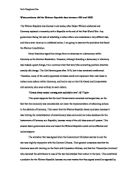To what extent did the Weimar Republic overcome its problems by the end of 1923? Between 1919 and 1923, the Weimar Republic of Germany was besot with more than its fair share of problems. In particular, the Weimar Republic had six main problems: Treaty of Versailles, Left wing opposition –Sparticists, Right wing opposition – Kapp Putsch, Munich Putsch, Freikorps and Political murders, Ruhr by French and Hyperinflation. This was known as the crisis of 1919 – 1923. The three main causes of the crisis were: The treatment of Germany by the allies, Economic difficulties, and Political difficulties. The Weimar Republic were able to solve some of these problems, however, a significant number of problems remained unsolved. By the end of 1923, the Weimar Republic were able to partly solve some of its problems. The Treaty of Versailles was a problem in Germany that







